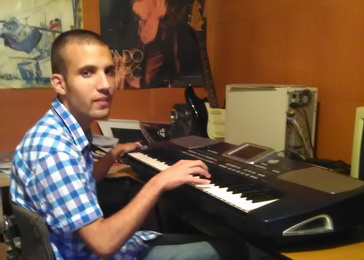 Author: Stefan Lazarević (Social Inclusion Blog)
Author: Stefan Lazarević (Social Inclusion Blog)
(…) As a very young boy, I learned all the letters on my own, Latin and Cyrillic. My parents say that I was able to read when I was three, maybe even sooner, which was quite unusual considering I started to talk rather late. Letters were always interesting to me, and I learned them with the help of newspapers and by watching shows and commercials on the TV. (…) I often flipped through my mother’s books, and I always used to read the imprint on the back of the book, because it reminded me of the closing credits of television shows.
I guess I learned the numbers the same way. I remember one situation that happened at the Institute for Psychophysiological Disorders when, during my speech therapy, I managed to read all the numbers from 1 to 20 written on some machine. The strange thing was that before that, I hardly ever spoke, and that was the moment my parents realized I could count, even though they never taught me how. I can’t explain exactly why numbers and letters were so important to me, but I remember the kids from my class when I started school, and how surprised they were that I was reading so quickly while they were just starting to learn letters. (…)
Ever since I can remember, I enjoyed studying the map of Belgrade. I had one printed edition which included one large map of the entire city and one for each municipality. I learned quite quickly where each street was and which municipality it belonged to. Afterwards, we bought a CD with the map of Belgrade, which also included all public transport lines, and for fun, I used to imagine riding around on buses and trams memorising their routes (…) I still find looking at Google maps amusing and very useful when I need to go somewhere I’ve never been before, so I can find my way faster and I don’t get lost. Apart from Belgrade, by using Google maps I study other cities some of them I have already visited and would like to visit again.
One of the things I am good at is calculating dates. When someone asks me which day will be on a specific date several years in the future or in the past, I can answer it correctly and people often can’t believe someone is able to calculate it so quickly. When they ask me how I can do that, I explain that I can add and subtract days and dates in my head. (…) Apart from being able to calculate dates, I remember events really well – when exactly something happened, exact date and day of the week, who was present, what kind of haircut they had and other similar things. If my parents can’t remember something, instead of looking it up, they always ask me first, because they know I have a good memory. (…)
I wrote several times about how I love music and how I started learning to play the keyboard. Some of the things I learned from one of my friends, and others I am learning on my own, by watching tutorials on the Internet. When I hear a song, I instantly know which key is used by the singer. Also, if it is a cover, I immediately say what the original was like, for example originally it was in D sharp minor, and the cover is in E minor. I always thought other people could do this too, but now I can see this is not the case. People find this talent I have quite interesting, and they often ask me how I do it, but I don’t know how to explain. I can also recognise the type of rhythm used as soon as the song starts if it is rhumba, or disco, or something else. Moreover, while learning to play a song, if the original is too high or too low, I can easily change the key, so it is easier for me to sing it. (…)
Some of the things I can do well are useful, and some are just fun; however, what I would like you to know is that people with autism can have talents too, and they can sometimes be more successful at them that you.
The text in its entirety can be found on the Social Inclusion Blog.
 Government of the Republic of Serbia
Government of the Republic of Serbia















 pdf [271 KB]
pdf [271 KB]
Leave a Comment